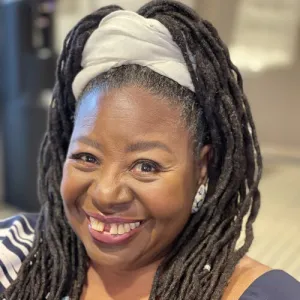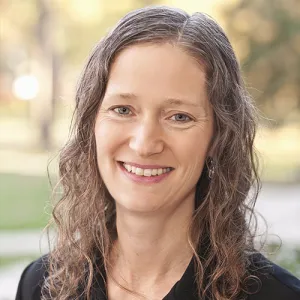‘Hope and Action’
Democracy in Action
Faculty and students reflect on the outcome of the 2024 presidential election

Published November 6, 2024
When Professor of Government Howard Gold taught his Elections in the Political Order class first thing on Wednesday morning after watching the previous night’s election results come in, he found students were eager to share their concerns about what the future might bring.

“Many students were extremely upset about the outcome,” Gold said. “They asked excellent questions about why Harris lost, what we might expect from a Trump administration, the extent to which gender and race influenced voters’ behavior, and what the future might look like for the Democratic Party.”
His own take? President Biden was a “major handicap,” he said. “Biden’s approval ratings were extremely low, and many voters thought the country was on the wrong track. There was not much Harris could do to dissociate herself from Biden.”
Across campus, similar discussions, observations, questions, and a range of emotions echoed throughout classrooms, houses, and pathways, as faculty, students, and staff responded to the outcome of the presidential election, which saw a victory by Donald Trump over Vice President Kamala Harris. The election capped a season that many described as unprecedented, with President Joe Biden dropping out over the summer, Harris stepping in as the Democratic nominee, and Trump surviving an assassination attempt.
Loretta Ross, associate professor of the study of women and gender, didn’t mince words when reflecting on the election results: “Just plain misogyny,” she said. “Harris ran a flawless campaign.”
Carrie Baker, Sylvia Dlugasch Bauman Chair of American Studies and professor of the study of women and gender, agreed that sexism played a significant role in Trump’s election. “Many in the United States still do not value women’s lives and humanity,” Baker said. “They elected a professed misogynist who has pledged to attack women’s rights in the workplace, and in education, as well as strip protections against men’s violence and attacks on our bodily autonomy.”

Baker, who has written frequently about access to abortion, expects that a Trump administration will “ban abortion nationwide and restrict access to contraception.”
In her Gender, Law, and Policy class on Wednesday, Baker listened as students spoke passionately about the impact of a Trump presidency on their futures, their families, democratic institutions, and vulnerable populations, including immigrants, children, and trans youth.
Amid the fear and anger, though, Baker also noted a desire among students to not “get stuck in their grief.” Among the student comments she logged in her notes from class: “Hope and action locally. It’s up to young people to keep up the fight. The pendulum will swing back and we’ll learn. We need to keep fighting.”
Naila Moreira, writing instructor and co-director of Smith’s journalism concentration, said she will be emphasizing “agency and action” to her students in the wake of the election, as well as “the importance of keeping untold ideas and voices alive in the media.” “There's still so much opportunity to put impactful journalism into the world right now, even—indeed, maybe especially—if you're not part of a large journalistic organization,” she said. “Even small-scale journalism can have a big ripple effect.”

To help students process the election, the college has a number of resources in place, including drop-in sessions at the Schacht Center for Health and Wellness, as well as events to encourage discussion. On Wednesday evening, for example, the Program for the Study of Women, Gender, and Sexuality hosted a session in the Neilson Browsing Room titled “What’s Next? Election Debriefing and Planning Our Future.” The Center for Religious and Spiritual Life is offering events all week, including open hours and cider and doughnuts on Thursday morning.
On campus Wednesday afternoon, students went about their daily routines, but the election results served as a backdrop to interactions and conversations with classmates and friends. Several students, who requested their names not be used, said they were simply trying to find the peace they’d been hoping for on election night.
Reading in the sun-dappled quad, one member of the class of 2027 recalled how grateful she was to watch the election results unfold in the company of other Smithies. “I had a night class, so I missed some of the earlier coverage, but afterwards I sat in the common room with my friends and watched from there. As things got closer and closer, more and more people started to gather in the common room,” she said. “I was really glad to have friends there with me because I felt pretty confident going in and then I think we all just felt really shocked. I didn’t think it was going to end up this way.”
She said she’s trying not to think too far into the future. “Right now, I just want to be outside and take my mind off of it all,” she said. “Later today, I’m going to cook with all of my friends and just share a meal together.”
Meanwhile, one student found some consolation in knowing that others share her belief in a more equitable and just world. “I still have hope there are enough people out there who don’t want this, but what scares me is how this will affect people’s basic rights,” she said. “No one person can fix the economy, but we can change the way that we treat others and prioritize basic human decency. We can’t fix society if we can’t help each other.”
Professor Ross echoed that sentiment, saying that she finds comfort in what she described as her “great national feminist network.” “We care about each other and that’s what gets me through,” she said.
Ross added that she expects Smith students are also building such networks. “Plan on keeping these people in your life as long as you can,” she said. “They will be necessary.”
